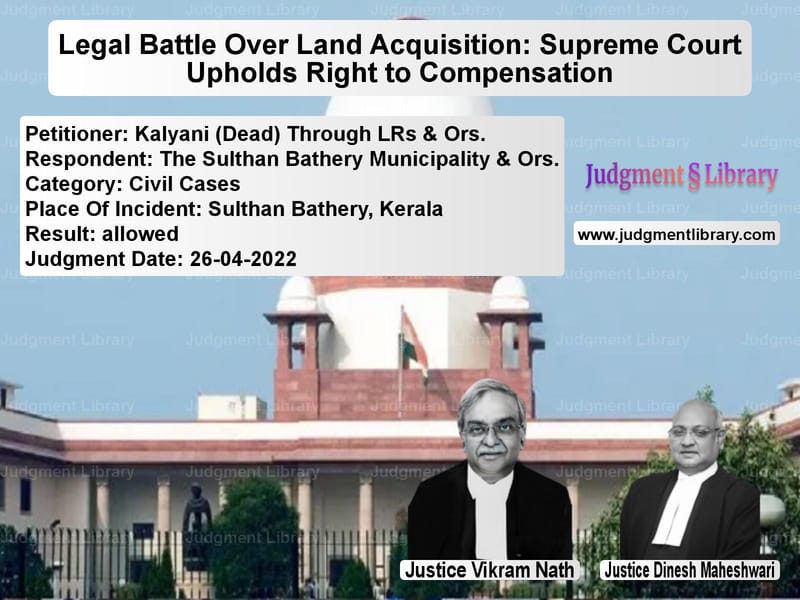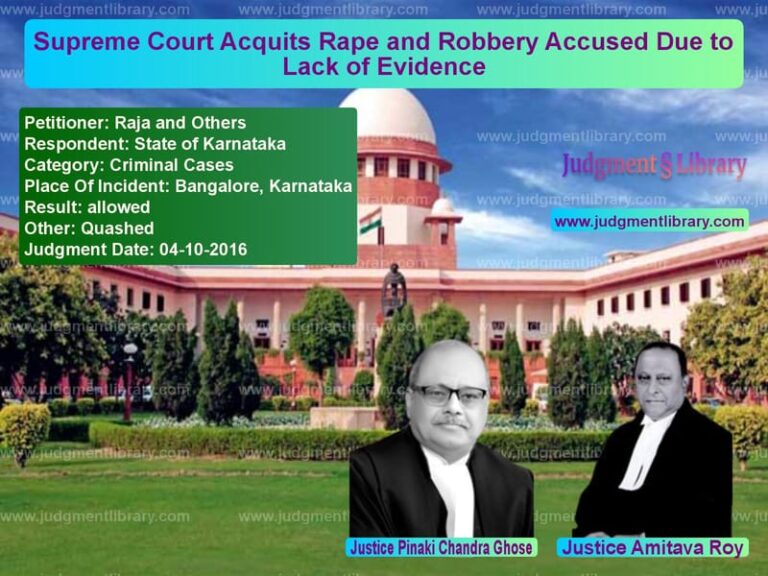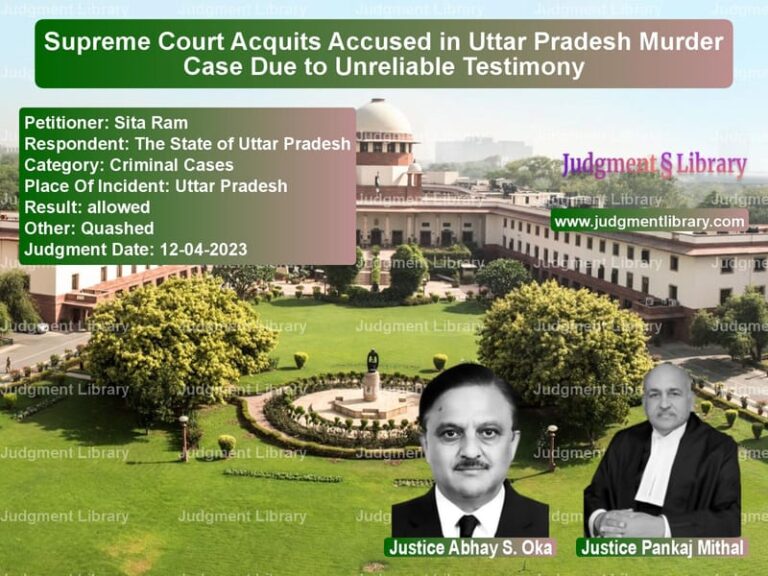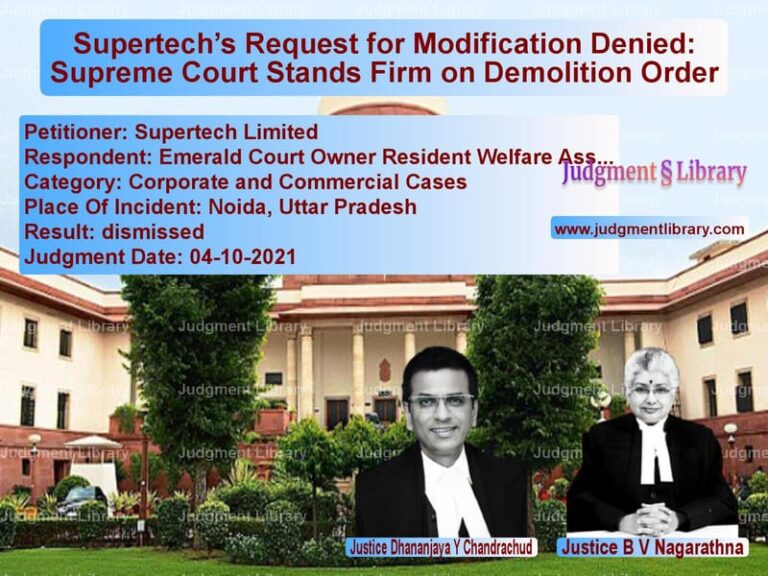Legal Battle Over Land Acquisition: Supreme Court Upholds Right to Compensation
The case before the Supreme Court of India centered around the dispute concerning land acquisition for the construction and widening of the Sulthan Bathery Bypass Road. The appellants, who owned 1.7078 hectares of land, contended that the Panchayat (later converted into a Municipality) had assured them compensation for their land, which was taken for the road project. However, despite repeated representations, no compensation was ever paid. The case raised fundamental questions about property rights and the constitutional mandate under Article 300A, which protects individuals from being deprived of their property without authority of law.
Background of the Case
The appellants, numbering eight, were owners of agricultural land in Sulthan Bathery, Kerala. The land fell within the territorial limits of the Sulthan Bathery Grama Panchayat, which later became a Municipality. The dispute arose when the Panchayat sought to use their land for the construction and widening of a bypass road. The appellants claimed that they agreed to allow their land to be used for the project based on the assurance that they would be compensated adequately.
The road was constructed, but the promised compensation never materialized. The appellants continuously approached the authorities, filing multiple representations seeking payment. When their pleas were ignored, they filed a writ petition before the Kerala High Court in 2014.
Arguments by the Parties
Petitioners’ Arguments
- The appellants contended that their land was taken by the Panchayat based on a promise of adequate compensation.
- They argued that since their land was used for a public project, they had a legal and constitutional right to compensation.
- They cited Article 300A of the Constitution, which states that no person shall be deprived of property save by authority of law.
- They further emphasized that there was no written agreement or documentation suggesting they had voluntarily surrendered their land without compensation.
- They presented evidence of multiple representations made to the authorities, seeking payment for their acquired land.
Respondents’ Arguments
- The Municipality claimed that the appellants had voluntarily surrendered their land for the road project.
- They argued that there was no written commitment from the Panchayat guaranteeing compensation.
- The respondents stated that the road was completed in 2010, while the appellants only approached the court in 2014, making their claim an afterthought.
- They also contended that there was no provision for compensating landowners for voluntary land contributions for road development.
High Court Rulings
Single Judge’s Judgment
The learned Single Judge ruled in favor of the appellants, emphasizing that there was no evidence to prove that the land was voluntarily surrendered. The judgment stated:
“There is absolutely no reason to disbelieve the stand taken by the petitioners. If the road was formed based on the decision taken by the Grama Panchayat, the case of the petitioners that they permitted the construction on the assurance of compensation must be accepted.”
The Single Judge concluded that the petitioners were entitled to compensation. The Court directed the District Collector to assess the market value of the land and ordered the Municipality to pay compensation within a stipulated period.
Division Bench’s Judgment
The Municipality challenged the Single Judge’s ruling before the Division Bench of the Kerala High Court. The Division Bench overturned the Single Judge’s judgment, ruling that the appellants had failed to prove that they were promised compensation. The Bench held:
“In the absence of any documentary evidence, the presumption is that the land was surrendered voluntarily. The representations claiming compensation appear to be afterthoughts.”
The Division Bench dismissed the appellants’ claim, stating that there was no legal provision mandating compensation in such cases.
Supreme Court Judgment
The appellants then approached the Supreme Court of India. The Court, led by Justices Vikram Nath and Dinesh Maheshwari, ruled in favor of the appellants and reinstated the Single Judge’s decision.
Key Findings of the Supreme Court
- The Court observed that the burden of proving voluntary surrender lay with the Municipality, not the appellants.
- The Court emphasized that Article 300A protects property rights and mandates compensation when land is acquired.
- The Court held that the Division Bench erred in shifting the burden of proof onto the appellants.
- The Court reaffirmed that the deprivation of property without due process violates constitutional principles.
- The Court cited previous judgments, including K.T. Plantation Private Limited v. State of Karnataka, which held that compensation is an inherent right under Article 300A.
The Supreme Court stated:
“The Municipality failed to provide any evidence showing voluntary surrender. Depriving the appellants of their property without legal authority is unconstitutional.”
Conclusion
This case reaffirms the fundamental principle that property cannot be taken without compensation unless there is express legal authority. The Supreme Court’s ruling sets a significant precedent, ensuring that municipalities and government bodies respect property rights and follow due process in land acquisition.
Read also: https://judgmentlibrary.com/supreme-court-upholds-validity-of-parents-wills-amidst-probate-dispute/
The judgment provides clarity on the responsibilities of government authorities when acquiring land for public projects. It also highlights the importance of documenting land transactions to prevent disputes in the future. The case serves as a strong reminder that constitutional rights, particularly those under Article 300A, must be upheld.
The Supreme Court’s decision ensures that affected landowners receive justice and that authorities adhere to lawful processes while acquiring private property for public use.
Petitioner Name: Kalyani (Dead) Through LRs & Ors..Respondent Name: The Sulthan Bathery Municipality & Ors..Judgment By: Justice Vikram Nath, Justice Dinesh Maheshwari.Place Of Incident: Sulthan Bathery, Kerala.Judgment Date: 26-04-2022.
Don’t miss out on the full details! Download the complete judgment in PDF format below and gain valuable insights instantly!
Download Judgment: kalyani-(dead)-throu-vs-the-sulthan-bathery-supreme-court-of-india-judgment-dated-26-04-2022.pdf
Directly Download Judgment: Directly download this Judgment
See all petitions in Property Disputes
See all petitions in Landlord-Tenant Disputes
See all petitions in Damages and Compensation
See all petitions in Judgment by Vikram Nath
See all petitions in Judgment by Dinesh Maheshwari
See all petitions in allowed
See all petitions in supreme court of India judgments April 2022
See all petitions in 2022 judgments
See all posts in Civil Cases Category
See all allowed petitions in Civil Cases Category
See all Dismissed petitions in Civil Cases Category
See all partially allowed petitions in Civil Cases Category







